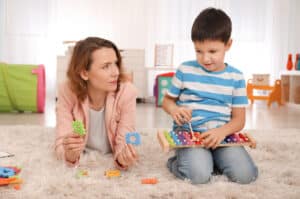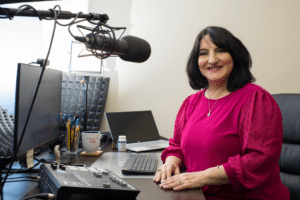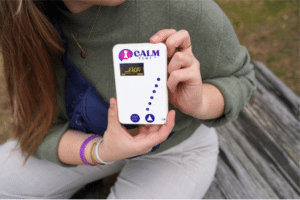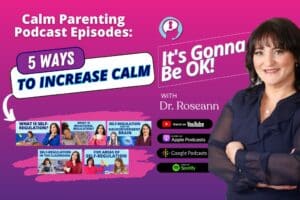What is Toxic Parenting?
Toxic parenting is a style of parenting that involves behaviors or actions that consistently cause harm or negative impact on a child's emotional, psychological, or physical well-being. Sometimes, parents don't even recognize they are parenting in a harmful way because that is how they were parented.
We all say things to our kids in the heat of the moment, but sometimes the root cause is our experience of being raised by an unhealthy parent. Toxic parenting is more than a momentary case of bad parenting. It is a pattern of harmful speech that harms a kid.
Parents who practice toxic parenting may use fear, guilt, or obligation to control their child's behavior. As a result, it can cause the child to feel afraid or insecure. Toxic parenting behavior can manifest in different ways, including neglect, emotional abuse, physical abuse, or a combination of these behaviors.
Neglectful parents may not provide adequate care, attention, or support for their child's needs. Emotionally abusive parents may belittle, criticize, or invalidate their child's feelings or needs. Physically abusive parents may use physical violence or aggression to control their child's behavior.
Toxic parenting can profoundly and deeply affect a child's mental health and well-being. Children who experience toxic parenting behavior are at increased risk for anxiety, depression, and other mental health issues. They may also struggle with relationships and have difficulty forming healthy attachments to others.
It's important to note that toxic parenting behavior is not always intentional. Parents who engage in toxic behavior may not realize the negative impact of their actions on their children. However, parents must be aware of their behavior and its potential impact on their child's well-being.
Ultimately, parents who engage in toxic parenting behavior can and should seek help to address underlying issues contributing to negative behavior patterns. Changing how one speaks to their child is where a parent should start.
15 Things That You Should Never Say to Your Child:
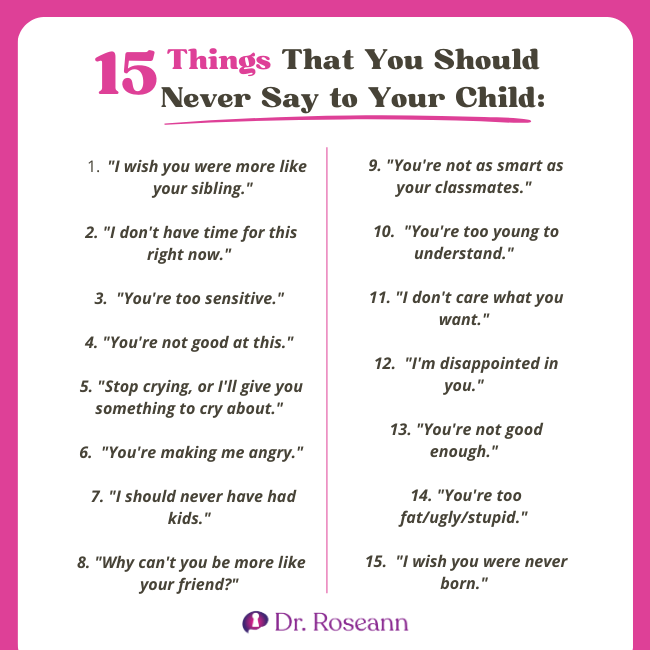
Toxic parenting is a style that can cause significant harm to children, leading to adverse effects on their emotional, mental, and physical health. Words mean a lot, and negative commentary can create lifelong damage to child development.
#1 “I wish you were more like your sibling.” Comparing your child to their sibling or anyone else can create feelings of inadequacy, low self-esteem, and a sense of not being good enough.
#2 “I don't have time for this right now.” Dismissing your child's feelings or needs can cause them to feel neglected, unheard, and unimportant.
#3 “You're too sensitive.” Invalidating your child's emotions can lead to difficulties in expressing and regulating their feelings in the future.
#4 “You're not good at this.” Criticizing your child's abilities can lead to low self-esteem, decreased motivation, and a lack of confidence.
#5 “Stop crying, or I'll give you something to cry about.” Threatening your child can cause fear, anxiety, and feelings of powerlessness.
#6 “You're making me angry.” Blaming your child for your emotions can lead to feelings of guilt and responsibility for things outside of their control.
#7 “I should never have had kids.” Expressing regret for having children can cause significant emotional distress and feelings of rejection in your child.
#8 “Why can't you be more like your friend?” Comparing your child to their peers can create a sense of competition, jealousy, and a lack of individuality.
#9 “You're not as smart as your classmates.” Belittling your child's intelligence can lead to low self-esteem, decreased motivation, and a lack of confidence in their abilities.
#10 “You're too young to understand.” Dismissing your child's opinions or feelings due to their age can cause them to feel unheard and unimportant.
#11 “I don't care what you want.” Disregarding your child's wishes and desires can cause them to feel unsupported, unloved, and neglected.
#12 “I'm disappointed in you.” Criticizing your child's actions can cause shame and a sense of not meeting expectations.
#13 “You're not good enough.” Belittling your child's efforts can lead to low self-esteem, decreased motivation, and a lack of confidence in their abilities.
#14 “You're too fat/ugly/stupid.” Criticizing your child's appearance can lead to low self-esteem, body image issues, and a sense of not being good enough.
#15 “I wish you were never born.” Expressing this type of statement can cause significant emotional distress and trauma, leading to adverse long-term effects on your child's well-being.
By avoiding these 15 things, you can foster a healthy and positive relationship with your child that will benefit them for years.
It's essential to be mindful of what you say to your child and strive to create a positive and supportive environment that promotes their healthy development. How we parent is shaped by how we were parented, but it doesn't define us. We can break unhealthy parenting parents.
What are the Effects of Toxic Parenting?
Now that you know more about toxic parenting, you can see how it can significantly impact children's development, both in the short and long term. Children who grow up in toxic environments may struggle with emotional and social development due to a lack of positive modeling and guidance. As a result, they may experience low self-esteem, difficulty trusting others, and struggle with self-identity.
We want our children to have a positive relationship with others and themselves, and that can be hard, if not impossible, if they don't have good self-esteem. So, critical and negative parenting is a self-esteem crusher.
Toxic parenting can also negatively affect academic performance, leading to cognitive and academic struggles. It is hard to focus and be productive at school when you have this negative voice in your head.
Toxic parenting can have long-term effects on emotional and psychological well-being. For example, children may develop personality disorders or mental health issues in adulthood due to the negative impact of toxic parenting. Additionally, children may develop anxiety and depression, making coping with stress and negative emotions difficult.
As a result, children raised in toxic environments may engage in risk-taking behaviors and struggle to form healthy relationships. How can you develop a healthy relationship if you don't know it?
The effects of toxic parenting on children's development:
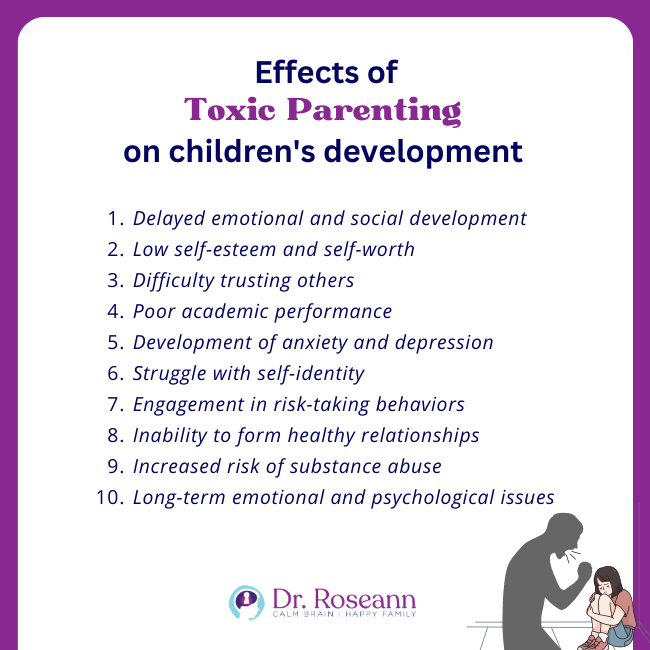
- Delayed emotional and social development
- Low self-esteem and self-worth
- Difficulty trusting others
- Poor academic performance
- Development of anxiety and depression
- Struggle with self-identity
- Engagement in risk-taking behaviors
- Inability to form healthy relationships
- Increased risk of substance abuse
- Long-term emotional and psychological issues
Parenting is undoubtedly one of the most challenging jobs in the world. As a parent, it's sometimes natural to feel frustrated, overwhelmed, and angry. However, it's important to remember that what you say to your child can impact their emotional well-being and development.
Recognizing and addressing these effects is crucial for breaking the cycle of dysfunction and promoting healthy relationships and development. Parents can seek help to learn positive parenting skills that can promote healthy development in children. Children raised in toxic environments can also benefit from therapy and support to heal from the trauma and develop healthy coping mechanisms.
How Negative Statements Hurt Children's Mental Health
What parents say to their children can shape their beliefs about themselves, others, and the world around them. Avoiding these negative statements is crucial for promoting healthy development in children. Children are highly impressionable and rely on their parents for guidance, support, and love; these negative statements can leave long-term damage.
I recently worked with a mom who thought she wasn't negative with her daughter because her husband was “ten times worse.” How we were raised can alter our perception of what healthy parenting is.
Here are some reasons why it's essential to avoid these types of statements:
Impact on self-esteem
Negative statements can significantly impact children's self-esteem, causing them to feel inadequate, unimportant, or not good enough. Conversely, children who receive positive reinforcement and support are more likely to develop a healthy sense of self-worth and self-esteem.
Impact on emotional regulation
Invalidating or dismissing children's emotions can lead to difficulties in emotional regulation and expression in the future. Children need to feel heard and supported in their emotions to develop healthy coping mechanisms and emotional regulation skills.
Impact on trust
Making negative comparisons or expressing disappointment can make children feel unsupported, unloved, and neglected. Children need to feel safe and secure in their relationship with their parents to develop healthy relationships with others in the future.
Impact on motivation
Criticizing or belittling children's efforts can lead to decreased motivation and a lack of confidence in their abilities. On the flip side, children who receive positive reinforcement and support are more likely to develop a healthy sense of motivation and drive.
Impact on behavior
Negative statements can lead to negative behavior, such as acting out or engaging in risky behavior. Children who receive positive reinforcement and support are more likely to develop healthy coping mechanisms and positive behavior patterns.
Impact on mental health
Negative statements can significantly impact children's mental health, increasing anxiety, depression, or other mental health issues. Children need a supportive and loving environment to promote healthy mental and emotional development.
Avoiding negative statements and toxic parenting is crucial for promoting healthy development in children. Parents can help their children develop healthy self-esteem, emotional regulation skills, trust, motivation, and behavior patterns by creating a supportive and positive environment.
How Parents Can Break Toxic Parenting Patterns
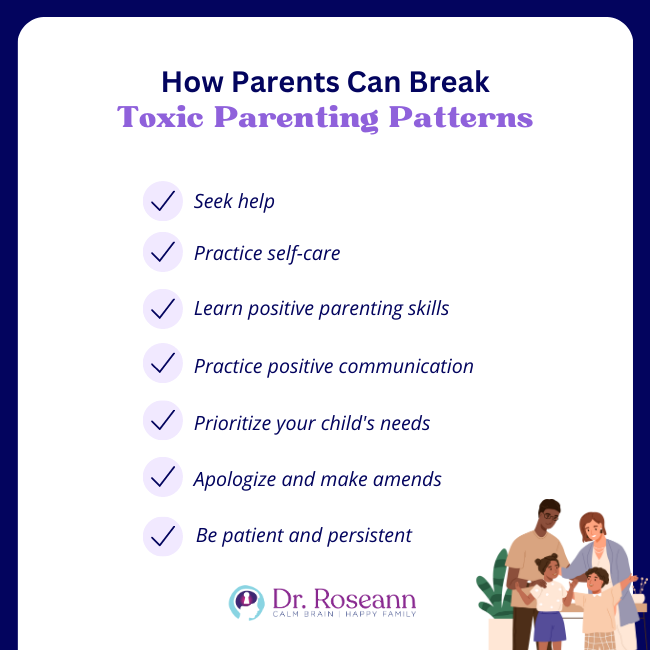
Breaking from toxic parenting patterns is crucial for promoting healthy development and well-being in children.
Here are some things a parent can do to break from toxic parenting patterns:
Seek help
Recognizing and addressing toxic parenting patterns can be challenging, and seeking help when necessary is important. But, first, consider seeing a therapist or counselor to address underlying issues contributing to negative behavior patterns.
Practice self-care:
Taking care of your mental health and well-being is crucial for breaking from toxic parenting patterns. Prioritize self-care activities that help you feel calm and centered, such as exercise, meditation, or spending time in nature. Remember, you must “share your calm” because your children co-regulate.
Learn positive parenting skills
Educate yourself on positive parenting skills that promote healthy development in children. Join a parenting group, read books or articles, or seek professional advice and coaching.
Practice positive communication
Focus on positive communication with your child, using supportive, encouraging, and affirming language. Avoid criticism or belittling, and instead, use positive reinforcement to promote positive behavior and let them know when they have done a good job or a kind action.
Prioritize your child's needs
Make an effort to prioritize your child's needs over your own, creating a safe and supportive environment where your child feels heard, loved, and supported.
Apologize and make amends
If you have engaged in toxic behavior, it's important to acknowledge it and make amends. Apologize to your child and try to change your behavior going forward.
Be patient and persistent
Breaking from toxic parenting patterns takes time and effort. Be patient with yourself and your child, and stay committed to making positive changes over the long term.
Breaking from toxic parenting patterns can be challenging, but it's crucial for promoting healthy development and well-being in children. By seeking help, practicing self-care, learning positive parenting skills, prioritizing your child's needs, apologizing and making amends, and being patient and persistent, you can create a safe and supportive environment where your child can thrive.
Always remember… “Calm Brain, Happy Family™”
Are you looking for SOLUTIONS for your struggling child or teen?
Dr. Roseann and her team are all about solutions, so you are in the right place!
There are 3 ways to work with Dr. Roseann:
You can get her books for parents and professionals, including: It’s Gonna Be OK™: Proven Ways to Improve Your Child’s Mental Health, Teletherapy Toolkit™ and Brain Under Attack: A Resource For Parents and Caregivers of Children With PANS, PANDAS, and Autoimmune Encephalopathy.
If you are a business or organization that needs proactive guidance to support employee mental health or an organization looking for a brand representative, check out Dr. Roseann’s media page and professional speaking page to see how we can work together.
Dr. Roseann is a Children’s Mental Health Expert and Therapist who has been featured in/on hundreds of media outlets including, CBS, NBC, FOX News, PIX11 NYC, The New York Times, The Washington Post,, Business Insider, USA Today, CNET, Marth Stewart, and PARENTS. FORBES called her, “A thought leader in children’s mental health.”

She is the founder and director of The Global Institute of Children’s Mental Health and Dr. Roseann Capanna-Hodge. Dr. Roseann is a Board Certified Neurofeedback (BCN) Practitioner, a Board Member of the Northeast Region Biofeedback Society (NRBS), Certified Integrative Medicine Mental Health Provider (CMHIMP) and an Amen Clinic Certified Brain Health Coach. She is also a member of The International Lyme Disease and Associated Disease Society (ILADS), The American Psychological Association (APA), Anxiety and Depression Association of America (ADAA) National Association of School Psychologists (NASP), International OCD Foundation (IOCDF) International Society for Neurofeedback and Research (ISNR) and The Association of Applied Psychophysiology and Biofeedback (AAPB).
© Roseann-Capanna-Hodge, LLC 2023
Disclaimer: This article is not intended to give health advice and it is recommended to consult with a physician before beginning any new wellness regime. *The effectiveness of diagnosis and treatment vary by patient and condition. Dr. Roseann Capanna-Hodge, LLC does not guarantee certain results.






